Reviews
Josef von Sternberg
USA, 1931
Credits
Review by Brynn White
Posted on 19 August 2010
Source Universal VHS
Categories von Sternberg & Dietrich
A von Sternberg-Dietrich twist on the dashing hero of international intrigue, Dishonored memorializes a woman “who might have been the greatest spy” were it not for her feminized code of honor. The opening intertitle — “Strange figures emerge from the dust of the falling Austrian empire” — hints more at an enigmatic phoenix than a secret agent. The subsequent opening shot showcases the Sternbergian essentials: legs and light. The gams of course belong to Miss Marlene, lady of the primordial shadows. She adjusts her stockings in a misty street illuminated by a single lamppost, the pitter-patter of the rain punctuating every gesture. Dishonored is bookended by the deaths of two prostitutes, one an anonymous suicide and the other a court-ordered execution. They are similarly without moral, bitter evidence of the world’s neglect of womankind and its misunderstanding of the politics of love—which to Sternberg are the root of all politics.
The black sheep of the royal crown, Dishonored is the least erotic of the cycle, a nihilistic rejection of female charm. It’s also the least discussed (by both critics and its creators) and screened, deemed “a fairly complete flop” by Paramount head B.P. Schulberg (despite its considerable box office success), and dismissed by Pauline Kael as “the dullest” of the Dietrich-von Sternberg collaborations. Due to its cartoonishly unworthy leading man, the higher expectations for narrative clarity due to its genre posturing, its abundance of (questionably intentional) sardonic humor, and the resoundingly audacious climax that damn near eclipses the prior 88 minutes, Dishonored has been relegated to capital-C Camp. While the film’s legacy could rest solely on its depiction of Dietrich applying lipstick before a firing squad, this delectable spectacle detracts from the film’s considerable virtues, appreciated by at least two elite champions: Jonathan Rosenbaum, who regards it as his favorite of the seven, and Jean-Luc Godard, who listed it as one of the Ten Best American Sound Films, as of 1964. Von Sternberg was displeased with the studio-mandated title, which casts improper judgment on the heroine’s death. The film’s reputation has suffered a comparable fate.
“Josef, there’s simply one thing I must have in Dishonored. I must have a cat for it—cats always bring me luck,” the legend requested of her Maestro for their third collaboration. Morocco was not yet released, but expected to take America by storm. Planes were dispatched to inscribe Hollywood’s new superstar into the skies. Von Sternberg had threatened to move on after two, but could not resist the demand for — or draw to — a new Dietrich vehicle. He worked from his own story “X-27,” which takes its eponymous streetwalker turned spy from her Austrian homeland to the borders of Poland and back again, to become femininity’s ultimate martyr. The film was rushed into production and editing (to beat Garbo to the punch; her Mata Hari spy vehicle came out the following year). They had, in addition to the feline, a loosely hinged espionage plot, a setting from the director’s youth, a Travis Banton full-bodied sequin suit, and a last resort leading man cacophonously beamed over from John Ford’s troupe after Gary Cooper declined to work with von Sternberg again.
From these disparate elements von Sternberg weaves a continent-spanning dreamscape of World War I. Plot mechanics are not always in line, but Dietrich’s hats certainly are. In this stylized realm meetings take place deep within labyrinthine chambers and a stateroom partially resembling a mad scientist’s laboratory. Characters make daring escapes through secret passages and talk more of their noble daring and imminent danger than concrete tactics. The war is shown only once in a brutal montage halfway through the film; the central battle is for a woman’s place in this universe. As spy X-27, Dietrich must strip her makeup and parade as a wide-eyed handmaid, meowing at drunken officers and engaging them in literal cat and mouse games; meanwhile, her globetrotting pet accompanies her in an open airplane ride to Poland and fatefully reveals her whereabouts when it is improbably identified by her enemy-lover.
Von Sternberg conceded Dietrich her pussycat but not its lucky charm. X-27 is spun into this web the night of a fellow prostitute’s death. A bystander sneers that she is destined for the same helpless surrender. In her most spirited of entrances, Dietrich contradicts, “No, I’m not! I am not afraid of life — although I’m not afraid of death either.” The commander of the Austrian secret services, piqued by her boldness, poses as a potential customer and they return to her room. She fetches the police when he suggests she ply her trade against Austria. She has passed the test. The next day he reveals his true identity. He commends her trickery and begrudgingly admits “a man’s brain cannot accomplish as much as a woman’s charm. You had me fooled!” He initiates her into their most”ignoble profession,” designates her agent X-27, and dispatches her to gather evidence against suspected traitors.
The first stop: a masquerade ball, one of Sternberg’s most kaleidoscopic confections. The director exponentially aggrandizes his tableau and handful of extras by the ingenious employment of mirrors. While hardly the most spark-generating duo of the cycle, X-27 and the Russian Colonel Kranau (played by Victor McLaglen) are bestowed the most deliriously memorable meet cute. The camera weaves through the “crumbling” empire’s debaucheries, partially obscured by streamer curlicues and phantasmagoric pockets of balloons. Sheathed in that skintight sequin sheath for her first tour of duty, X-27 amuses herself by sweeping piles of confetti off a balcony into the lap of the ready-and-waiting Colonel. He sends her notes from below via balloon, which the masked damsel playfully pops. These secret messages evoke the mocking disdain for espionage throughout the film. It is a game played by man-children with their secret codes and invisible ink. (An amateur sport still being played: see New York’s recent Russian ‘spy ring’ expose.)
X-27 has no use for such maneuvers, but she cannot resist this sexual playmate, even if he is the man she is ordered to expose. They later rendezvous by a roulette wheel. Dietrich’s subtle grasp of a barside woman’s hand before making her approach is the only interaction between her character and another woman in the film. And it’s a telling one: she’s losing her footing in this masculine sphere. She’s falling in love. The Colonel is insolent, constantly laughing at his own jokes and everyone around him. He captures the devotion of Dietrich, she of the sly smile and laconic sense of humor. She offers herself to him as Lady Luck and he cheekily retorts, “Good or bad?” Pauline Kael chided the “eye exercises” Dietrich performs throughout the film, but these kinetic displays stress the motifs of observation and movement, not to mention the uncontainable delight of a woman over a man that keeps her so efficiently on her toes.
The frequent criticism leveraged against Dishonored is the miscasting of Victor McLaglen. Bereft of leading man sheen, he is difficult to even recognize amongst the soldier extras. His buffoonish potato head is an unworthy match to Dietrich’s chiseled cheekbones — it is as if they are parading in two entirely different movies — but perfectly serves von Sternberg’s grand design of the male war state. After all, von Sternberg’s World War I dominion is inhabited by ineffectual innocents, such as the young soldier so entranced by X-27 that after mere minutes he claims he could “walk with forever”; her cretin employer who so begrudgingly acknowledges her strengths and punctuates every address to her with a contemptuous “Ha!”; the spineless traitor she entraps, who eats a few grapes before shooting himself amongst his finery rather than face his deserved fate—or is it disappointment over his failed romantic interlude with Dietrich? He suggests that they might have had a charming night together were the circumstances different. She annihilates his fantasy with her withering assertion, “Then we might never have met.”
The Colonel speaks of Mother Russia but only glimmers as he discusses the adrenaline rush. “When you’re a pilot, you’re either flying or you’re dead,” he boasts (neglecting to mention the parties and casinos he is more often seen enjoying). Kranau claims to love X-27 the more she cheats and lies, and is notably absent when she is punished for being honest with her heart. McLaglen allegedly remarked that watching his director and leading lady gave him a temperature; neither the man nor the character could acclimate himself to sacrifice in the name of passion. Von Sternberg’s ultimate lack of interest in this caricature of male bravado is evident as the film abandons him to a bullet-riddled airfield he deems more “exciting” than his surrendering lover.
As X-27 reminiscences over their intimacy, von Sternberg overlays dissolve shots not of her suitor, but of her own euphoric expression as she clutches her cat, her eyes darting about in a state of hyper-emotion. While a man may have inspired these feelings, the capacity to experience them is entirely a woman’s own. This is reiterated when the Austrian officials express incomprehension of a love bloomed after only a few hours, one that would motivate her to release their enemy. Her loyalty in the face of grave peril, a spy’s most essential attribute, is deemed an act of treason. Her love, her very essence, is legally deemed invalid. “That is the love of the streets,” they spit at her; and it is her uniform of the streets, “the one I have served my countrymen in,” that comprises the doomed woman’s final subversive statement.
But she is also granted a swan song, after her death row request for a piano is granted in addition to her furs. In other von Sternberg films, Dietrich’s characters seem aloof towards their profession as a performer; it is a means to an end, a lesser form of prostitution. In Dishonored, performance takes on more expressive significance. At the beginning of the film, the secret service commander takes a seat at her piano and she mocks his casual tinkering, “Shall I put in another coin?” When she takes to the keys, she plays full-throttle sonatas, her shoulders pulsating in ecstatic release. When again left alone, von Sternberg frames her in bracing intimacy: the audience’s viewpoint converges with the piano’s as she makes her approach. But just as we are granted this privileged peephole into the enigmatic heroine, her eyes shift away from us. Such soul-bearing directness can only be funneled into her instrument. Later, as X-27, she will use her own creative skill and resourcefulness to encode confidential information into her musical compositions. Kranau burns the manuscripts, but she reconstructs them from memory and valiantly plays the Russian front’s operations for a small crowd of enraptured Austrian officials. They can only appreciate her prowess when it is in their service. Her last performance is for no one but herself, in her prison antechamber, preparing to die in the name of love.
X-27’s name, Maria, is only uttered once in the film. It is a shocking moment: the humanization of this untenable, mystical creature. Of her past, we learn only that she is the widow of an Austrian officer. There is no trace of remorse or discontent with her lot in life. Dietrich’s magnetism lies in the titillating combination of a confident knowingness and the absence of processing thought—a childlike creature entirely of the present. Sternberg showcases two figurines dangling from the rafters of Maria’s room. Like them, she remains unflappably anchored to her own agenda, yet simultaneously drifting in a vulnerable dance with external forces. In life, Maria is both bound by her womanhood and its capacity for passion. No matter how many disguises she tries on she cannot shed these life-giving forces. And no matter how men choose to interpret her, they are ultimately moved to destroy what they cannot understand… No wonder Sternberg tried to jump ship after two films.
The woman is the inevitable wartime sacrifice in Sternberg’s boffo finale. In Morocco, Dietrich shuns all vanity to charge barefoot into the desert after the man she loves, but she and Sternberg retaliate in Dishonored with the noble transcendence of glamour. The baby-faced soldier must escort the woman he wanted to walk with forever to her execution. He offers his sabre so that she may adjust her hat and veil in its reflection. On her final stage before the cocked rifles she braces herself, arm defiantly on hip. Her expression is purely serene. When the mortified youngster refuses to lead the charge, crying out that he will not kill a woman, Maria seizes the extra seconds of time on earth to adjust her stocking and apply her lipstick. The display borders on the macabre and the absurd, but triumphs as an unparalleled expression of feminine gumption. Von Sternberg coaxes: Die gallantly and leave a good looking corpse! Dietrich, for her part, was preoccupied with contributing a realistic gunfired projectile fall. Together they create, as Molly Haskell asserts, “the ultimate vision of beauty as courage and the ultimate victory of style (Dietrich’s and Sternberg’s) over content; style has become content.” This purportedly politically conscious film is drowned by one defiant cock of the hip.
More von Sternberg & Dietrich
-
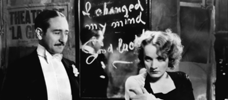
Morocco
1930 -
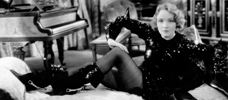
Dishonored
1931 -
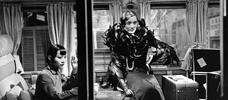
Shanghai Express
1932 -
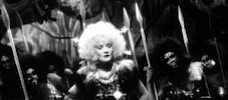
Blonde Venus
1932 -
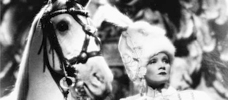
The Scarlet Empress
1934 -
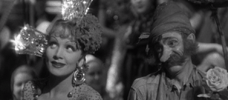
The Devil is a Woman
1935
We don’t do comments anymore, but you may contact us here or find us on Twitter or Facebook.



